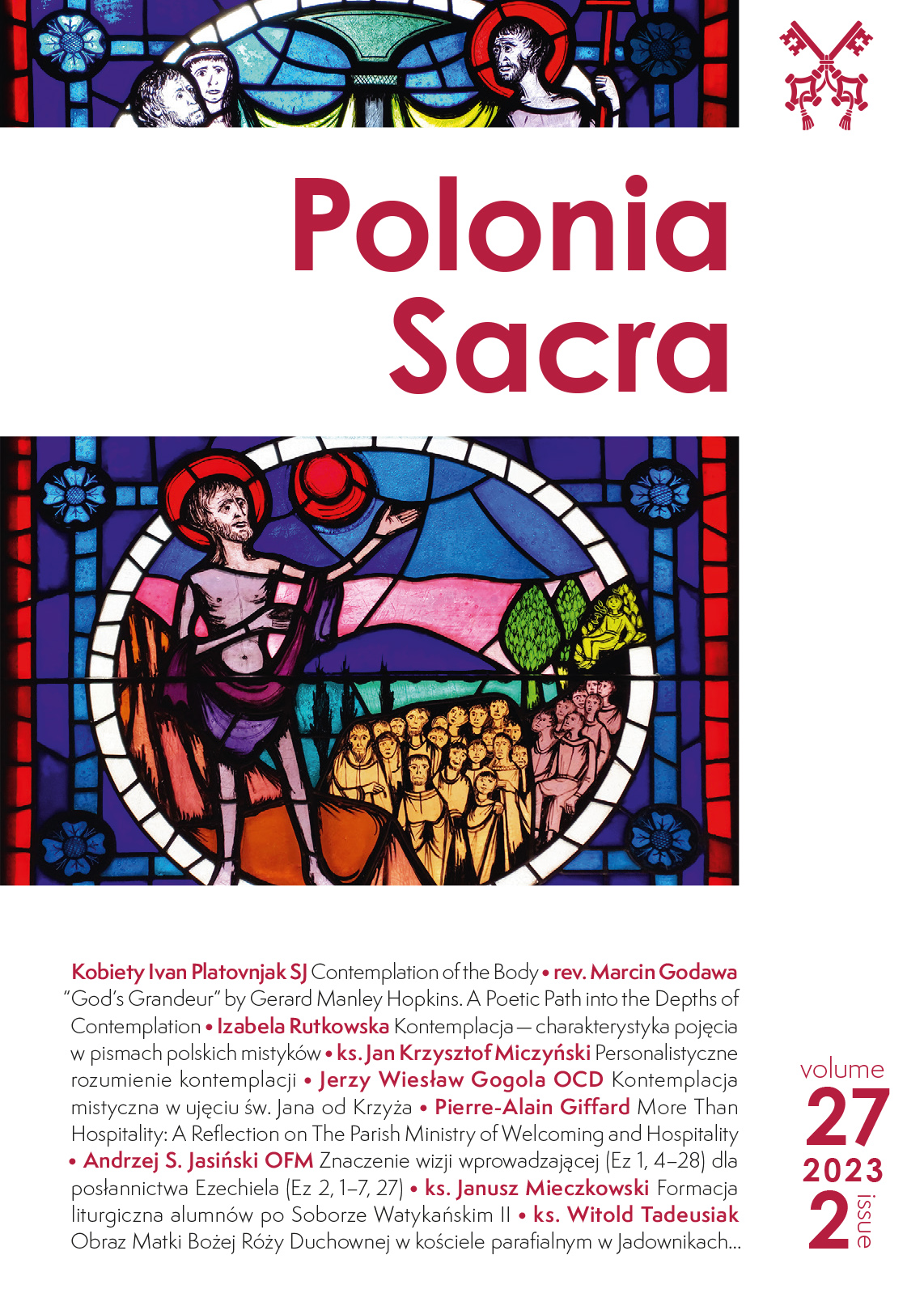Mystical Contemplation According to St John of the Cross
DOI:
https://doi.org/10.15633/ps.27205Keywords:
contemplation, mystical contemplation, mystical experienceAbstract
This article discusses the problem of mystical contemplation in St John of the Cross. Its implementation required an explanation of the concept of contemplation both in a broad and strictly mystical sense. Its close connection to the spiritual life of a Christian has been shown. Both contemplation and the spiritual life have their source in baptismal grace, which contains all the potential for spiritual development. Baptismal grace constitutes the basic aptitude for union with God, for contemplation of the deepest divine mysteries; it guarantees the reception of the work of the Holy Spirit, whom Christ has sent into our hearts to complete the work of sanctification. However, it is a divine mystery why the “influence of God on the soul” is not in every case accompanied by the same experiential form. The next stage of reflection confronts ordinary contemplation with mystical contemplation, to then consider its two forms: purifying and unifying. These are experienced by many believers, but not in the same way and not in the same proportion. Assuming authentic faithfulness on the part of the believer, with different forms of experiencing the relationship with God and the spiritual processes taking place, it must be said that it depends on God’s pedagogy. God knows best which way to lead a person towards a supernatural goal and how to make him an effective witness to Christ. Two dimensions of mystical contemplation are further considered: the theological, i.e., objective, and the experiential, i.e., subjective. The methods of analysis and synthesis have been applied. The source texts have been reflected upon in order to analyse them and draw appropriate conclusions. The final conclusions are as follows: Contemplation, according to St John of the Cross, is a form of theological life. As it appears, it influences all other forms of prayer: liturgical, oral, reading of Scripture, and it leads to simplicity and loving attention to God. It does not replace these forms, but feeds on them and at the same time enriches them. There can be no significant contrast between the different types of prayer. In the life of St John of the Cross himself, we observe the practice of prayer until death in all its forms, including oral prayer. The believer’s contemplation has its source in the hidden and secret work of the Holy Spirit. Without His work it would not be possible. Contrary to popular opinions, it points first and foremost to the primacy of God’s action in the process of sanctification, while human activity has the nature of a response to this action.
References
Agaesse P., Sales M., Mystique, Dictionnaire de Spiritualité Ascetique et Mystique, red. M. Viller, 10 (1980), s. 1939–1984.
Alvarez T., Ancilli E., Contemplazione, w: Dizionario Enciclopedico di Spiritualità, t. 1, Roma 1990, s. 455–456.
Ancilli E., La mistica: Alla ricerca di una definizione, w: La mistica, a cura di E. Ancilli, M. Paparozzi, Roma 1984 , t. 1, s. 17–40.
Baroffio B., La mistica della parola, w: La mistica, a cura di E. Ancilli, M. Paparozzi, Roma 1984, t. 2, s. 31–46.
Bernard Ch. A., Teologia mistica, a cura di M. G. Muzi, Torino 2005.
Bernard Ch. A., Teologia spirituale, Roma 1983.
Bernard Ch. A., Wprowadzenie do teologii duchowości, tłum. J. Machniak, Kraków 1996, s. 78–80.
Duque J. M., Mistica: experiencia del Misterio, Valencia 1995.
Egan D. E., Christian mysticism the future of a tradition, Minnesota 1990.
Gogola J. W., Teologia komunii z Bogiem. Synteza teologii duchowości, Kraków 2003.
Gogola J. W., Święty Jan od Krzyża dzisiaj. Doktryna sanjuanistyczna w świetle współczesnej duchowości, Kraków 2018.
Gogola J. W., Od Objawienia do zjednoczenia. Synteza teologii modlitwy, Kraków 2008.
Gogola J. W., Życie mistyczne Teresy od Jezusa Marchockiej. Studium z duchowości karmelitańskiej, Kraków 1995.
Gogola J. W., Realność doświadczenia Boga, „Homo Dei” 76 (2007) nr 2, s. 10–21.
Garrigou-Lagrange R., Perfection chrétienne et contemplation selon St. Thomas et St. Jean de la Croix, St. Maximin 1923.
Garrigou-Lagrange R., Trzy okresy życia wewnętrznego wstępem do życia w niebie, tłum. s. Teresa Franciszka, t. 1–2, Poznań 1962.
Herraiz M., Contemplazione, w: Dizionario di Mistica, a cura di L. Boriello, E. Caruana i inni, Vaticano 1998, s. 338–348.
Marchetti A., Zarys teologii życia duchowego, tłum. E. Bielecki, Kraków 1996, t. 2, s. 176–185.
Poulain A., Łaski modlitwy, tłum. J. Roztworowski, Poznań–Warszawa–Lublin 1967.
Royo Marín A., La teologia de la perfección cristiana, Madrid 1988.
Ruiz Salvador F., Caminos del Espirítu. Compendio de Teologia espiritual, Madrid 1978.
Święty Jan od Krzyża, Doktor Kościoła, Dzieła, z hiszp. przeł. B. Smyrak, Kraków 2010.
Zarzycki S. T., Kontemplacja, w: Leksykon duchowości katolickiej, red. M. Chmielewski, Lublin 2002, s. 432–446.
Downloads
Published
Issue
Section
License

This work is licensed under a Creative Commons Attribution 4.0 International License.
Authors who publish in this journal agree to the following terms:
- Authors retain the copyright and full publishing rights without restrictions and grant the journal right of first publication with the work simultaneously licensed under a Creative Commons Attribution 4.0 International License that allows others to share the work with an acknowledgement of the work's authorship and initial publication in this journal.
- Authors are able to enter into separate, additional contractual arrangements for the non-exclusive distribution of the journal's published version of the work (e.g., post it to an institutional repository or publish it in a book), with an acknowledgement of its initial publication in this journal.
- Authors are permitted and encouraged to post their work online (e.g., in institutional repositories or on their website) prior to and during the submission process, as this can lead to productive exchanges, as well as earlier and greater citation of published work (See The Effect of Open Access).

